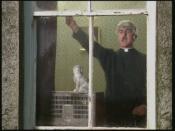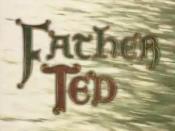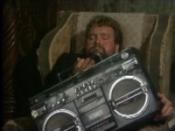In the first stanza, the boy had a tantrum, "splashing" his "bare feet" around a puddle. The father doesn't approve of this, and "struck(s)" a "quick slap" across his son's face. However, the father refuses to show any signs "of guilt or sorrow" for what he has done. The father is regretful but thinks it is more important for his son's development that he remains staunch. The boy is waiting for his father to apologise, but his father refuses to give in, because he doesn't want to give his son the idea that he can get away with more incidents like this. This gives the impression of a boy who knows the effect he has on his father, and waits for signs that he is weakening.
The father realises that there is an inner evil in his son which needs controlling. There is frequent use of onomatopoeia such as when he describes his son as an "ogre", despite his size.
The boy still wants revenge on his parent, believing the latter thinks nothing of him. Since the boy has thoughts of wanting revenge, the punishment viewed in this light seems to be justified.
The father hopes in time, his son will "understand" the need for discipline, and this is expressed through the words "but dare not ruin the lessons you should learn". This occasion is also tough for the father because he is hiding his inner core of uncertainty and suffering "behind that mask", after "slapping" the boy. The father is not repent; he is a man who follows absolute values. He doesn't seem to comprehend that mercy is more powerful than judging to the letter of the law.
The use of contrast, such as the boy's slack behaviour and his father's firmness, helps add depth to the...



My feeling
A father and his son is quite complicated. sometimes a child doesn't really know much the feeling of his parents, either parents don't know ours sometimes. I think we should respect others. That's what I though after reading your notes. Do you agree with me ?
6 out of 9 people found this comment useful.